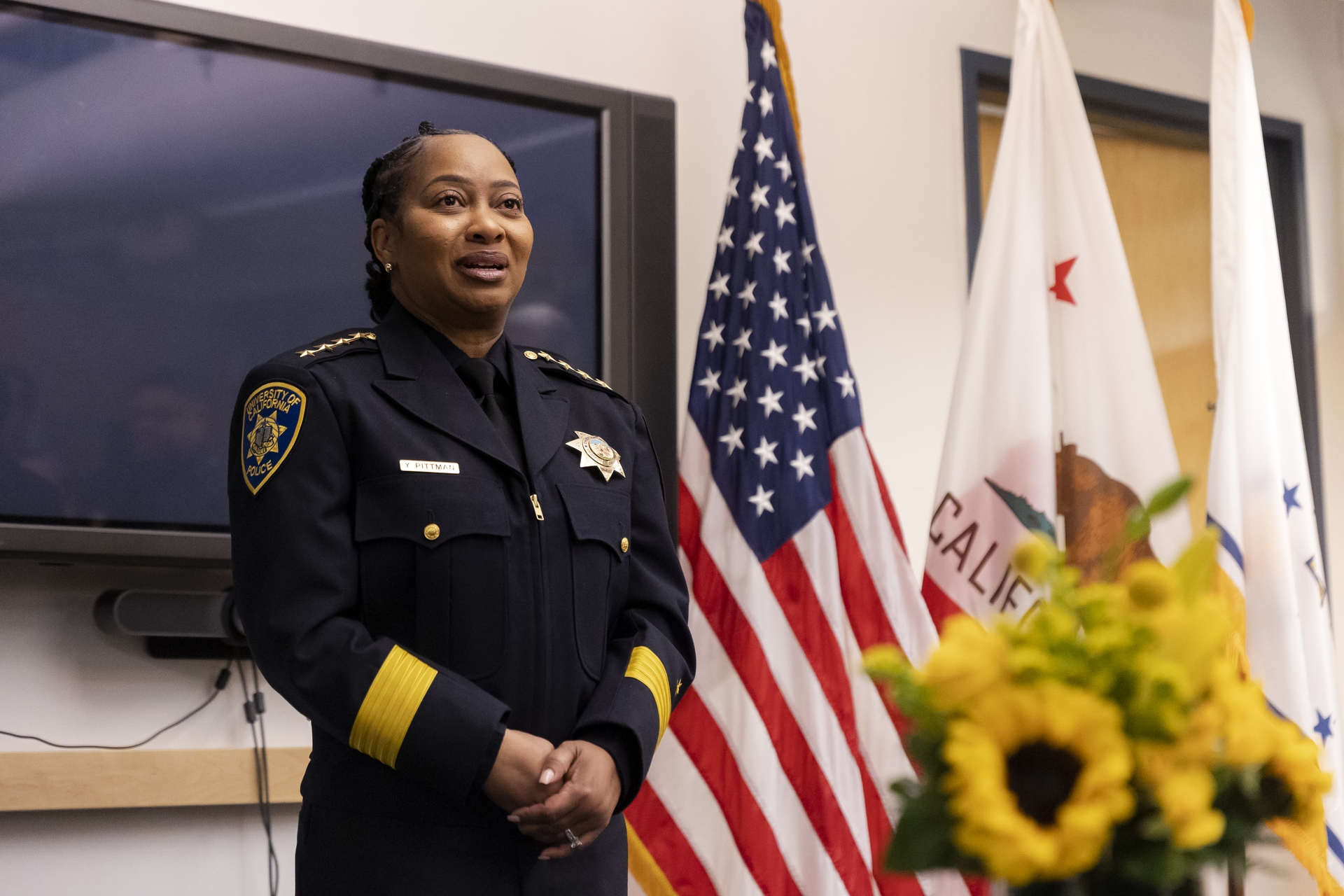UC Berkeley police chief: Collaboration is key in confronting campus crime
In a wide-ranging Campus Conversations event, Chief Yogananda Pittman talked about rising crime rates, basic safety measures and how the Jan. 6 insurrection has shaped her work since becoming UC Berkeley's top cop.

Brittany Hosea-Small for UC Berkeley
September 13, 2023
When it comes to crime, UC Berkeley Police Chief Yoganada Pittman knows perception is reality. Now, with some types of crime increasing on and around campus, Pittman says it’s essential for people to be vigilant, report problems and for her department to lean in on community collaborations to make campus feel — and be — as safe as possible.
“I would be remiss if I did not acknowledge the crime rates in the Bay Area and the surrounding community,” Pittman said Tuesday during a livestreamed Campus Conversations event. “I think we have to acknowledge that.”
In a wide-ranging, hourlong dialogue that included viewer questions, Pittman talked about her transition from a top cop in Washington, D.C., to UC Berkeley’s newest chief of police. She outlined her view of the changing nature of policing and offered her assessment of what an increase in crime — locally and in cities nationwide — means for campus law enforcement.
People should be aware of their surroundings, Pittman said. That means removing earbuds and looking up from a phone screen when walking. Traveling in groups is also encouraged, especially at night, as is staying aware of where incidents around campus are occurring.
It was particularly timely advice. Alerts from the UC Berkeley WarnMe system in recent weeks have cautioned about midday robberies, carjackings and — last weekend — a person allegedly wielding a pickax. Thefts and assaults have tended upward recently. While the campus is relatively safe, UCPD routinely reminds people that Berkeley is in an urban environment where crime occurs, which is all the more reason to take precautions when out and about.
“The numbers are, quite frankly, concerning,” Pittman said. “They’re very concerning. And the numbers do appear to be on the rise. With that said, we do really have to adhere to what our best safety practices are and really reach out to the community.”
Multiple viewers raised questions about the prevalence of non-university-affiliated people on campus. Pittman said she’s assigned officers to parking garages during busy times. She also said UCPD is working to provide timely, and increasingly targeted, campus safety notifications, including those via the WarnMe system. Also, she said, people should avoid holding the door open to “tailgaters” — strangers who follow university affiliates into a secured building, like a residence hall.
“Crime has to be addressed as a collaboration between law enforcement and the community,” Pittman said. “And our students are a part of that community.”
Before taking the helm of UC Berkeley’s police department in February, Pittman spent more than 20 years with the U.S. Capitol Police. She was sworn in just hours after the Sept. 11, 2001, terror attacks. Two decades later, after a mob stormed the U.S. Capitol, she was appointed interim chief, making her the first woman and the first Black person to lead the department.
Those were especially difficult times, she said Tuesday. On her first day as the interim leader, U.S. Capitol Police Officer Howard Liebengood died by suicide. The department was also still reeling from the death earlier in the week of another officer, Brian Sicknick.
Those events and the actions of officers in the weeks that followed have stuck with her.
“I never want anyone to forget what we lost. I also don’t want anyone to forget the resiliency of those that serve the United States Capitol Police,” Pittman said. “Those women and men saved democracy. They literally were the last line of defense between those insurrectionists and members of the congressional community.
“They held fast that day. It wasn’t pretty. It was brutal.”
Since arriving in Berkeley, Pittman has led a multi-year campus security reform program to improve emergency management, mental health crisis response and security technology and to strengthen relations with diverse communities. She’s also pursuing a comprehensive approach to responding to different calls with the department’s 42 sworn officers, 25 security patrol officers who are unarmed, and 55 community service officers, who are students.
Together, alongside community groups she continues to meet with, Pittman said she’s optimistic that crime trends will decline and people will feel increasingly safe around campus.
“There’s a big difference between being safe and feeling safe,” Pittman said. “If you don’t feel safe, no matter what the numbers say, no matter what the subject matter experts say, that’s just a feeling inside of you that we’re going to have to work together to change.”